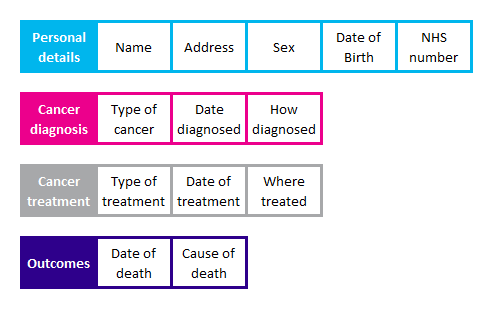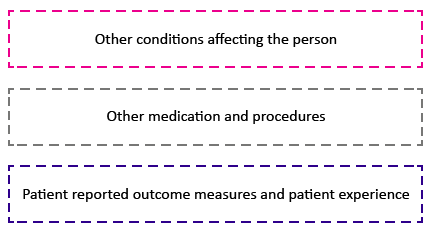What is cancer registration?

What is it for?
Want to know more about the the way cancer registation information is used?
When a person is diagnosed with cancer in the UK information about them is automatically included in their national cancer registry.
It is data from cancer registries that tells us how many people are diagnosed with cancer, what treatments they have, how long they live, and whether this is getting better or worse. This information can then be used to help plan cancer services and identify where further progress is needed in order to improve the lives of all people affected by cancer.
The cancer registry is a list of people diagnosed with cancer, collected directly from hospitals and healthcare professionals. It is a database of information about cancer patients.
Most data is collected automatically from hospitals:

Some data is obtained through surveys or linked to NHS records:

In England, the cancer registry is managed by the National Cancer Registration and Analysis Service (NCRAS). This is a team that sits inside Public Health England, an arm’s length body of the government that works closely with the NHS. The registry receives details about everyone diagnosed with cancer directly from the hospital or healthcare professionals.
See an explanation of cancer registration in the UK
National Cancer Registration and Analysis Service
For more information about cancer registration in the rest of the UK visit:
The Welsh Cancer Intelligence and Surveillance Unit
Information about a person is included in the national cancer registry when they have been diagnosed with cancer. A small number of people also have their information included in the registry because they are diagnosed with a certain condition that can lead to cancer or their doctor suspects they may have cancer and sends them for further tests.
This process currently happens automatically, with information coming directly from hospitals and healthcare professionals.
This means the information available in a timely fashion and its reliability can be checked and improved quickly. It also ensures that information about people who are diagnosed with cancer very late or who only survive for a short time is also collected.
People can choose not to have their information included in the registry if they prefer by contacting the cancer registry in their country.
Cancer registries take great care to keep the information they hold about patients confidential and, as with other medical records, strict ethical and security safeguards are in place and access is strictly controlled.
Cancer registry officials and data analysts are permitted to access and use cancer registry data, to support the provision of health and social care or the promotion of health. When data are released outside the cancer registry there is a strict approval process.
Most releases of data from the cancer registry involve aggregated and anonymous data from which individual identifiers have been removed. Most of the cancer statistics presented on this website come from anonymous data provided by the UK’s cancer registries.
Data that identifies an individual may only be released if that person gives their consent, the data is being provided to those involved in their direct care or an independent advisory group grants special legal permission. Data will only be released if the recipient will use it for providing health or social care or for the promotion of health, and they can prove they can keep the data secure.
The cancer registry aims to include information on all cancer patients. This is because the more complete the cancer registries are, the more useful they are.
The completeness of the registry is most important when trying to understand things that only affect a small number of people of people. For example:
- Rarer cancers
- A potential cause of cancer in a small group e.g. children who live near a power line
All health data and medical information, whether held in paper records or on computers, has the potential to be lost or stolen. Some people worry about what could happen if information about their health did manage to get into the wrong hands.
However, because information about health is sensitive, by law it has to be kept under the highest levels of safety and security. The cancer registry is held on a secure computer database with tightly controlled and restricted access.
Your details will be included on the Cancer Registry automatically.
It is possible to opt-out of cancer registration.
See the National Disease Registration Service’s information on opting-out
 What is cancer registration?
What is cancer registration?